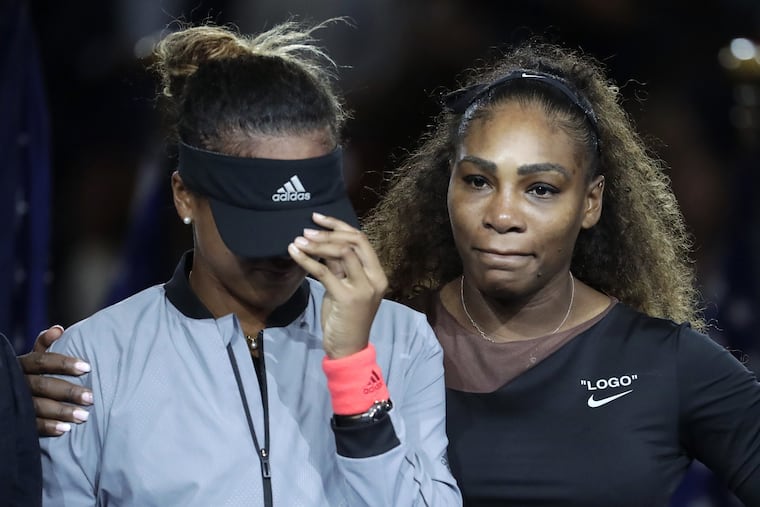Serena Williams’ loss is a fabulous, winning lesson for girls | Perspective
In the midst of her U.S. Open loss, Serena Williams provides a compelling example for how girls can speak their minds and stand their ground, even against strong challengers.

More people than ever are talking about the women's finals of this weekend's U.S. Open — not because of what happened on the court but because of drama on the sidelines. Not because of the skill and stellar play that helped Naomi Osaka win her first Grand Slam but because one of the greatest tennis players of all time was penalized for being too audacious, too outspoken, and yes, too unfeminine.
The story unfolded during the second set, as Serena Williams' competitive spirit and aggressive style came through in a highly emotional way. She was accused of being coached, which she disputed, and received a code violation warning. She smashed her racket in frustration and got a point penalty. She demanded the umpire apologize for insinuating that she was cheating — calling him a "thief" for stealing the set from her — and was given a game penalty.
Male tennis players, including Patrick McEnroe and James Blake, freely admit guys have done much worse without such harsh consequences.
Ultimately, she lost the match and the U.S. Open title. But in Williams' loss is a fabulous, winning lesson for kids, especially girls.
First, celebrating Williams' 31 Grand Slam final — this one, exactly a year after she gave birth to her first child — reminds kids that healthy competitiveness is an asset and that girls shouldn't stop themselves from being aggressive and ambitious. While boys seem to naturally absorb that idea, it's something that we shy away from encouraging in young women — and is one reason why, by age 14, girls stop playing competitive sports twice as often as boys. This despite the fact that embracing one's competitive spirit is critical for career success, particularly at senior leadership levels. Serena Williams is exactly the role model our girls need, showing them that inner competitiveness is a good thing.
What's more, as a black woman in a sport historically dominated by white men, the image of Williams standing up for herself with the umpire — owning the power of her voice — is one that all young women should see.
Even as we remind our kids about the importance of sportsmanship and respectful dialogue, girls today also need to know that being a strong self-advocate is crucial. And that, given the gender discrimination still rampant across society, girls standing up for themselves sometimes requires significant inner strength and a loud "unfeminine" voice. In the midst of her U.S. Open loss, Serena Williams provides a compelling example for how girls can speak their minds and stand their ground, even against strong challengers.
Then there's the trophy ceremony, during which Williams showed the world how to be not just bold and strong but gracious and a good sportsman, too. As the crowd's boos drowned out the shining moment of Osaka's young career, Williams put an arm around her competitor and whispered words of encouragement in her ear. Knowing that her powerful voice could sway public sentiment, Williams took the mic to say, "Let's make this the best moment we can … Let's not boo anymore," and then congratulated the young woman who beat her. A great example of sportsmanship in action and, also, the influence that comes when women support other women.
We've long encouraged our boys to be competitive and aggressive. To be strong self-advocates, and to be gracious in defeat. To use the power of their voice. It's time that we help girls embrace these lessons, too.
The winning moments of Serena William's U.S. Open loss are a good place to start.
Marisa Porges is head of school at The Baldwin School, an all-girls independent school in Bryn Mawr.